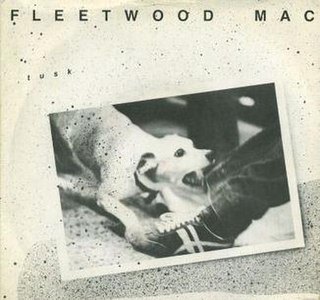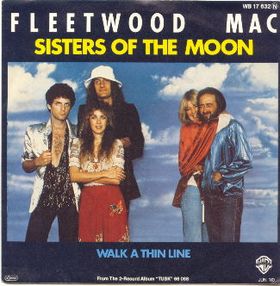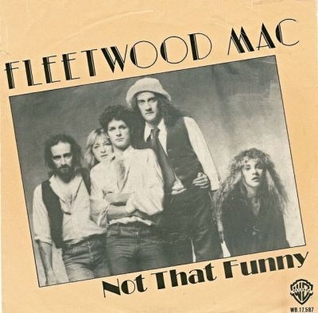Related Research Articles

The Dance is a live album by the British-American rock band Fleetwood Mac, released on 19 August 1997. It hailed the return of the band's most successful lineup of Lindsey Buckingham, Mick Fleetwood, Christine McVie, John McVie, and Stevie Nicks, who had not released an album together since 1987's Tango in the Night, a decade earlier. It was the first Fleetwood Mac release to top the U.S. album charts since 1982's Mirage.

"Don't Stop" is a song by the British-American rock band Fleetwood Mac, written by Christine McVie. The song was sung by Lindsey Buckingham and McVie, and was released as a single from the band's album Rumours (1977).
"Second Hand News" is a song written by Lindsey Buckingham. The song was first performed by the British-American rock band Fleetwood Mac as the opening track of their 1977 album Rumours.

"You Make Loving Fun" is a song by the British-American rock band Fleetwood Mac, written and sung by Christine McVie. It was released as the fourth and final single from the band's 1977 album Rumours. "You Make Loving Fun" peaked at number nine on the US Billboard Hot 100 and became the album's fourth top-ten hit.

"Tusk" is a song by British-American rock band Fleetwood Mac from the 1979 double LP of the same name. The song peaked at number eight in the United States for three weeks, reached number six in the United Kingdom, number five in Canada, and number three in Australia. Lindsey Buckingham wrote the song and is the lead singer on the track.
"The Ledge" is a song by the British-American rock band Fleetwood Mac, released in 1979. It is the second song from the multi-platinum Tusk album and was composed by Fleetwood Mac guitarist Lindsey Buckingham. The band rehearsed “The Ledge” several times for the Tusk Tour, although it was ultimately not included in the set.

"Sara" is a song written by singer-songwriter Stevie Nicks of the British-American rock band Fleetwood Mac, which was released as a single from the 1979 Tusk double LP. The song peaked at No. 7 in the US for three weeks, No. 37 in the UK for two weeks, No. 11 in Australia, and No. 12 in Canada.

"Sisters of the Moon" is a song by British-American rock group Fleetwood Mac. It was written and sung by band-member Stevie Nicks and was released in the US as the fourth single from the 1979 album Tusk. The song peaked at No. 86 on the Billboard Hot 100, although it was not released in the UK. The single version of "Sisters of the Moon" is included on the compilation The Very Best of Fleetwood Mac and both the 2004 and 2015 remasters of 'Tusk'.
"I'm So Afraid" is a song written by Lindsey Buckingham for the British-American rock band Fleetwood Mac for their tenth album, Fleetwood Mac. The song was intended for a second Buckingham Nicks album, but the album never came to fruition.

"Love in Store" is a song by British-American rock group Fleetwood Mac. The song is the opening track on the 1982 album Mirage, the fourth album by the band with Lindsey Buckingham acting as main producer with Richard Dashut and Ken Caillat. "Love in Store" was written by Christine McVie and Jim Recor and it became the album's third single in the US. Released in November 1982, it went on to peak at No. 22 for three weeks as the follow-up to Top 20 hits "Hold Me" and "Gypsy". It also peaked at number 11 on the Adult Contemporary chart. The song features lead vocals by Christine McVie with prominent vocal harmonies by Stevie Nicks and background vocals by Lindsey Buckingham.

"Think About Me" is a song by British-American rock band Fleetwood Mac, released in the US in March 1980. The song was composed by Fleetwood Mac keyboardist Christine McVie. "Think About Me" was slightly remixed for single release.
"I Know I'm Not Wrong" is a song by Fleetwood Mac from the 1979 double LP Tusk. It was recorded as the final song of side three of the LP on 19 September 1979, written by Lindsey Buckingham, whose sparser songwriting arrangements and the influence of punk rock and new wave were the leading creative force on it and other Tusk tracks. The song was worked on for the duration of the Tusk album and took around a year to complete.
"Oh Daddy" is a song written by Christine McVie that was first performed by the British-American rock band Fleetwood Mac as the tenth song off their 1977 album Rumours.

"Not That Funny" is a song by British-American rock band Fleetwood Mac, released in 1980. Composed and sung by guitarist Lindsey Buckingham, it was written as a response to the punk movement in the late 1970s. The song shares some lyrics with "I Know I'm Not Wrong", another Buckingham penned song that appeared on the Tusk album.
"That’s All For Everyone" is a song by British-American rock band Fleetwood Mac, released in 1979. Composed and sung by guitarist Lindsey Buckingham, it was one of his nine songs that appeared on the Tusk album. The song was also included on Fleetwood Mac's 1992 box set, 25 Years – The Chain.
"Brown Eyes" is a song by Fleetwood Mac from the 1979 double LP Tusk. It was one of six songs from the album composed and sung by Christine McVie. The song includes uncredited playing from founding member Peter Green.
"Over & Over" is a song by British-American rock band Fleetwood Mac, released in 1979. It is the opening song from the multi-platinum Tusk album and was composed by Fleetwood Mac keyboardist Christine McVie. The song was played on the Tusk Tour and also appeared on the Live album in 1980.
"What Makes You Think You're the One" is a song by British-American rock band Fleetwood Mac, released in 1979. Composed and sung by guitarist Lindsey Buckingham, it was one of his nine songs that appeared on the Tusk album. The song was also included on the US 2002 and UK 2009 editions of The Very Best of Fleetwood Mac.
"Storms" is a song by British-American rock band Fleetwood Mac, released in 1979. Composed and sung by vocalist Stevie Nicks, it was one of her five songs that appeared on the Tusk album. The song was also included on the US 2002 and UK 2009 editions of The Very Best of Fleetwood Mac as the final track on disc one. An alternate mix with more stripped back production was included on the 2015 deluxe edition of Tusk. Nicks said that the song was about her affair with bandmate Mick Fleetwood, which she believed contributed to the dissolution of his marriage with Jenny Boyd.
"That's Enough For Me" is a song by Fleetwood Mac from the 1979 double LP Tusk, on which it is the shortest track. It was one of nine songs from the album composed and sung by Lindsey Buckingham, who also supplied all of the instrumentation. The song was released a B-side to "Sara" in December 1979.
References
- ↑ Holden, Stephen (13 December 1979). "Fleetwood Mac Tusk Album Review". Rolling Stone. Retrieved May 9, 2016.
- 1 2 3 4 Caillat, Ken; Rojas, Hernan (2019). Get Tusked: The Inside Story of Fleetwood Mac's Most Anticipated Album. Guilford, Connecticut: Backbeat Books. pp. 284–292. ISBN 978-1-4930-5983-6.
- ↑ Irvin, Jim (2016). Tusk (2015 Remastered) (Liner Notes). Fleetwood Mac. Los Angeles: Warner Bros. Records Inc. p. 17. Publisher Warner Bros #2HS-3350.
- ↑ Zollo, Paul (1997). "Songwriters On Songwriting, Expanded Edition". The Blue Letter Archives. Archived from the original on 2015-12-30. Retrieved 19 May 2023.
- ↑ Anderson, Sam (18 February 2015). "Letter of Recommendation: Fleetwood Mac 'Tusk'". New York Times. Retrieved 12 September 2016.
- ↑ Fleetwood, Mick; Bozza, Anthony (October 2014). Play On: Now, Then & Fleetwood Mac. New York: Little, Brown And Company. p. 257. ISBN 978-0-316-40342-9.
- ↑ Bosso, Joe (27 July 2012). "Mick Fleetwood: my 11 greatest recordings of all time – Walk a Thin Line". Music Radar. Retrieved May 15, 2016.
- ↑ "Mick Fleetwood Still Misses Best Friend George Harrison". Contactmusic. 22 March 2012. Retrieved May 7, 2016.
- ↑ Leng, Simon (2006). The Music of George Harrison: While My Guitar Gently Weeps. 7777 Bluemound Road, P.O. Box 13819, Milwaukee, WI 53213: Hal Leonard Corporation. p. 159. ISBN 1-4234-0609-5 . Retrieved May 7, 2016.
{{cite book}}: CS1 maint: location (link) - ↑ "George Hawkins Question and Answer Session - April 4 - 19, 2000". The Penguin. Archived from the original on 13 May 2019. Retrieved 29 December 2023.
- ↑ Wild, Stevie David (25 September 2016). "'The beautiful blur' that is Mirage". Stevie Nicks Info. Retrieved 29 December 2023.